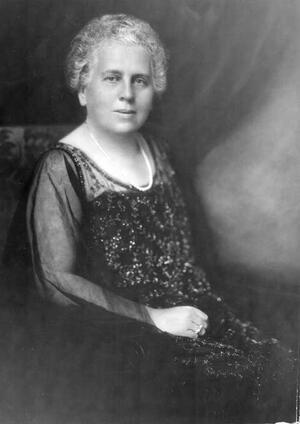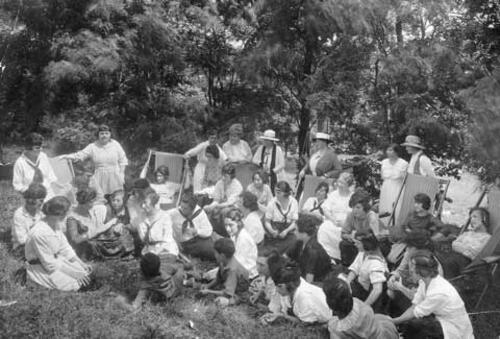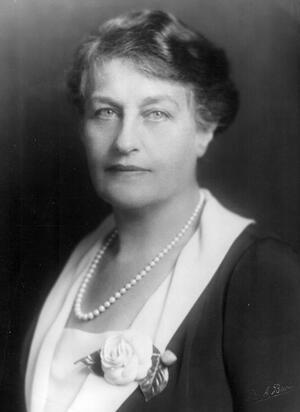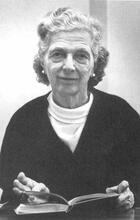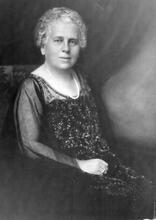Frieda Schiff Warburg
Frieda Schiff Warburg’s determination to carry on her father’s philanthropic traditions led her to support and shape major Jewish institutions in America and Israel. Warburg began volunteering as director of the Brightside Day Nursery, then moved to the Young Women’s Hebrew Association as director and then president. She was the first woman on the Jewish Theological Seminary’s board of directors, a position she held until her death. A committed Zionist who supported a variety of Jewish philanthropic organizations, she was named honorary chair of the Hadassah Hospital building fund, established a scholarship fund for medical students, and gave generously to United Jewish Appeal’s efforts to aid immigrants to Israel. During World War II, Warburg rescued friends and family from Europe, housing refugees in her homes.
An astute, generous, and well-read woman, Frieda Schiff Warburg was an example both of the opportunities made possible by great wealth and the educational and vocational limitations imposed on women of her time. Her pattern of giving was more a reflection of her desire to carry on her family’s philanthropic tradition—particularly her father’s—than an expression of interests she developed on her own. It also served as a kind of substitute for the religious observance that had been important to her father, but that she did not feel moved to carry on in her own life.
Warburg’s upbringing and family life
Frieda Schiff Warburg was born on February 3, 1876, into the privileged world of New York City’s German Jewish elite. She was the daughter of Jacob Schiff, head of the Kuhn, Loeb banking firm and one of the preeminent Jewish communal leaders of his day. Her mother was Therese Loeb Schiff, daughter of the firm’s founder.
While the principal focus of Frieda’s life was on her home and family, in her public life she followed the model established by her father. Her grandmother, Betty Loeb, who, along with Jacob Schiff, was the original backer of Lillian Wald’s Henry Street Settlement and Visiting Nurse Service, also served as a model for her charitable giving.
Frieda Warburg contributed sizable sums and held largely honorary positions in many, mostly Jewish, organizations in which her family had already set the pattern of involvement. During the last two decades of her life, when her children were occupied with their own lives, and her father, husband, and brother, Mortimer Schiff, had all died, nearly the full weight of the family’s philanthropic and communal responsibilities fell on her shoulders.
Frieda Schiff was poorly prepared for any kind of public career. While both her brother and husband became partners in Kuhn, Loeb, the firm cofounded by her grandfather Solomon Loeb and headed by Jacob Schiff, no such career could be contemplated for a woman of Frieda’s time and social milieu. Her upbringing was opulent—including private lessons in piano, French, Bible, horseback riding, dancing, and fencing—but her formal education ended with her graduation from the exclusive all-girl Brearley School.
In 1895, Frieda Schiff married Felix Warburg, the Hamburg-born son of the M.M. Warburg and Company banking family. They had five children, Carola (b. 1896), Frederick (b. 1897), Gerald (b. 1901), Paul (b. 1904), and Edward (b. 1908).
Philanthropic beginnings
Warburg began her philanthropic work after her marriage as a director of the Brightside Day Nursery. In 1911, she became a director of the Young Women’s Hebrew Association (YWHA) and later its president (1929–1942).
In 1938, following a tradition established by her father, husband, and brother, Frieda Warburg became a member of the board of directors of the Jewish Theological Seminary of America, and served until her death. As the first and, during most of her tenure, only woman on the seminary’s board, she was consulted about the seminary’s programs for women.
In 1944, she contributed her Fifth Avenue mansion to the seminary. In 1947, it opened in the former Warburg house as the Jewish Museum.
Other organizations she supported include the Henry Street Settlement and Visiting Nurse Service, the American Jewish Joint Distribution Committee, the Women’s Division of the Federation of Jewish Philanthropies of New York, Hadassah, and the Jewish Welfare Board. Between 1943 and 1945, she served as honorary vice president of the New York City Welfare Council.
Israeli, Jewish, and Holocaust-era work
Although both Frieda and Felix Warburg maintained their position as non-Zionists, their first trip to Palestine in the early 1920s, made with the encouragement of Chaim Weizmann, turned them into enthusiastic supporters of development there. In 1936, Frieda Warburg was honorary chair of the building fund campaign for the Hadassah Hospital in Jerusalem. In 1949, she established a $100,000 fund for medical scholarships at the hospital, and in 1951, she contributed $650,000 to the United Jewish Appeal to house and educate new immigrants to Israel. She also supported the Hebrew University, as had her husband, and she served as the honorary vice president of the International Youth Aliyah Committee.
In 1935 the Warburgs founded the Felix M. and Frieda Schiff Warburg Foundation. With Frieda Warburg as president and her five children as members, the foundation chiefly supported Jewish causes but, reflecting the interests of the Warburg children, also funded health, education, civic, art, music, and African-American organizations.
During the Nazi era, Frieda Warburg responded by helping rescue friends and family members caught in Germany, housing many of these refugees at her homes in Manhattan and White Plains, New York.
Warburg’s legacy
She received honors during her later years, among them honorary degrees from the Jewish Theological Seminary and Hebrew Union College, both in 1945.
Frieda Schiff Warburg died at her home in White Plains on September 14, 1958. In her estate of more than $9 million, she left bequests to her family and to the many organizations she had supported during her lifetime.
Adler, Cyrus. Felix M. Warburg: A Biographical Sketch (1938), and Jacob Schiff. His Life and Letters (1928).
AJYB 61 (1960): 419.
Chernow, Ron. The Warburgs: The Twentieth-Century Odyssey of a Remarkable Jewish Family (1993).
EJ.
JTS Records, R.G.1 and R.G.11. JTS; Miller, Julie. “Planning the Jewish Museum, 1944–1947.” Conservative Judaism 47 (Fall 1994): 60–73.
Obituary. NYTimes, September 15, 1958, 21:3.
UJE.
Warburg, Frieda Schiff. Reminiscences of a Long Life (1956).
“Warburg Estate Put at Nine Million,” NYTimes, September 23, 1958.
Weber, Nicholas Fox. Patron Saints: Five Rebels Who Opened America to a New Art, 1928–1943 (1992).
WWIAJ (1938).
Young Women’s Hebrew Association. Records, R.G.5. YM-YWHA Archives, 92nd Street YM-YWHA, NYC.

